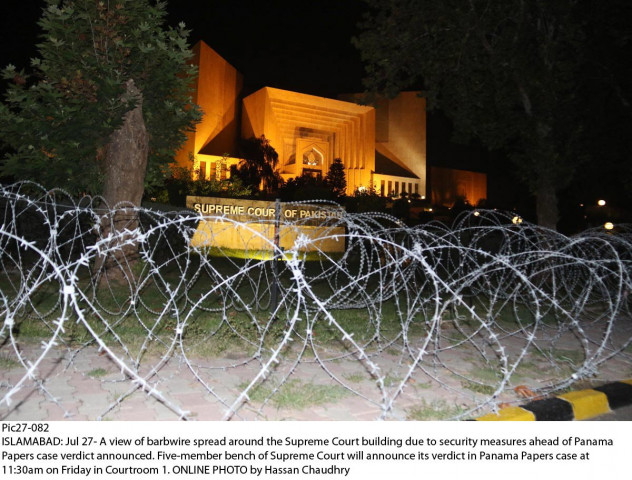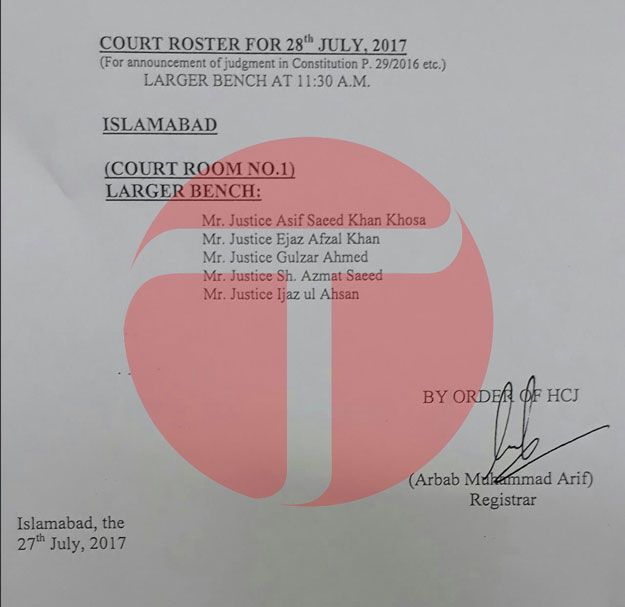Supreme Court to rule on PM Nawaz's fate
All eyes on apex court as 5-judge bench will give much-awaited verdict at 11:30am

The judges picked Friday to announce the much-awaited verdict. Interestingly, all landmark judgments – be it the 2007 reinstatement of Iftikhar Chaudhry as the chief justice of Pakistan; revocation of the emergency rule the same year; or the annulment of the NRO in 2009 – had been delivered on Fridays.
Frenzied media speculation started since Thursday morning about when the top court will deliver the verdict a three-judge bench had reserved on July 21. The guessing game was prompted by reports that two of the judges were going on leave. However, the Supreme Court registrar put an end to the conjectures by issuing the cause list after scheduled timing.
Imran Khan will not visit SC for Panamagate verdict
"As long as the Supreme Court stays within the law, we feel very good and confident that nothing negative will happen to the prime minister," Miftah Ismail, a state minister and senior official in Sharif's ruling PML-N party, told Reuters.
"If the Supreme Court takes a flight away from strict interpretation of the law, then anything can happen."
Contrary to earlier assessments of proceedings, the verdict will be announced by the original five-judge bench that issued a split verdict on April 20 in which two justices ruled that Premier Sharif must be disqualified for not being ‘honest and sagacious’, while the rest seeking further investigations into corruption charges against him.
Justice Asif Saeed Khosa will head the bench which also comprises Justices Ejaz Afzal Khan, Gulzar Ahmed, Sheikh Azmat Saeed and Ijazul Ahsan.
The Sharif family’s legal team was shocked to learn that. In their assessment, the final judgment would be handed down by the three-judge bench which heard the case after receiving the Joint Investigation Team’s damning report on the ‘murky’ financial dealings of the ruling family.

If one of the three judges disqualifies Sharif, then it will be considered a majority judgment as two judges of the original five-member bench have already ruled against the prime minister.
While speaking to The Express Tribune, a top jurist of the country said he is praying that either the majority judges refer the matter for trial without disqualifying the prime minister or four judges of the five judges disqualify Sharif. “If the disqualification is three-to-two, then questions will be raised about the revival of the five-judge larger bench.”
Legal experts point to a “number of ambiguities in the April 20 order of the court” which, they believe, might give rise to such questions.
The experts believe the Panamagate case involves two key issues: Firstly, the bench will rule on the matter related to the Sharif family’s assets beyond known means in view of evidence collected by the JIT; secondly, the bench will decide on the alleged concealment of assets by Sharif and his son-in-law Captain Safdar. Similarly, the judges will also consider the issue of alleged forgery in documents by the respondents.
Nisar says will ‘give up politics’ after Panamagate verdict
However, observers of the Panamagate case proceedings believe the three judges in their separate notes in the April 20 verdict had given somewhat divergent views on the applicability of Article 62 (1) (f) of the Constitution.
One is the minority view [authored by Justice Asif Saeed Khosa], which is based on morality and Haqooq-ul-Allah and Haqooq-ul-Ibad and the conflict of interest by the public office holder. The second is the majority judgment, wherein it is stated that violation of legal obligation or breach of law is necessary for the applicability of Article 62(1)(f) of the Constitution.
Sharif family and superior courts
The superior judiciary has adjudicated a number of cases involving the Sharif family – and in most cases the family got relief from the court.
On March 24, 2009, the Iftikhar Chaudhry-led top judiciary had decided to take up appeals against the disqualification of Nawaz Sharif and Shahbaz Sharif. On March 31, 2009, a five-judge bench, headed by Justice Tassaduq Hussain Jilani had stayed its February 25 order and restored Shahbaz as Chief Minister of Punjab.
On May 26, 2009, the same bench had declared the Sharif brothers qualified to contest the elections.
On January 18, 2012, the Supreme Court had upheld a Lahore High Court verdict and directed the National Accountability Bureau to release assets of the Sharif brothers. A three-member bench, headed by CJP himself, while rejecting the Lahore High Court appeal, said that keeping the assets in custody was an unlawful and unconstitutional act.
On October 4, 2011, the LHC had asked NAB to return to the Sharif family share certificates worth Rs100 million, prize bonds worth Rs115 million, and documents pertaining to land in Murree, Chaudhry Sugar Mills, Hudabiya Engineering Services, Hamza Shipping Corporation and Ramzan Sugar Mills.
The Supreme Court had accepted Shahid Orakzai’s petition for regular hearing against the qualification of Shahbaz as Punjab chief minister. The petitioner contended that Shahbaz had vacated the PP-10 seat and resigned from PP-48 seat after becoming the chief executive of the province. “Without any seat in the assembly, he cannot hold the office,” Orakzai contended.
CSB meeting minutes forwarded to PM
It is worth mentioning that Shehbaz’s eligibility case could not be adjudicated by the apex court during his five years in the Chief Minister House.
In November 2011, the SC had also admitted the petitions of Nawaz Sharif, Ishaq Dar, PML-N’s presidents of all four provinces, AJK and Gilgit-Baltistan seeking a probe into the Memogate scandal. Sharif himself had appeared before the apex court on December 1, 2011 and on his first appearance, the court gave him relief by forming a commission to probe the scandal.
[/fbvideo]
Panama Papers case: A timeline
- April 3, 2016: Leaked documents from the Mossack Fonseca law firm in Panama shows several world leaders, including Prime Minister Nawaz Sharif’s three children – Hassan, Hussain, and Maryam – owning at least two offshore companies registered in the British Virgin Islands
- April 4, 2016: Pakistan Tehreek-e-Insaf chief Imran Khan, among other opposition groups accuse the PM and his family of corruption and money laundering, demand an investigation
- November 1, 2016: Following two addresses to the nation by the PM, call for ‘Islamabad lockdown’ by PTI, and petitions in the Supreme Court to investigate the matter, top court forms five-member bench to probe the ruling family’s offshore assets
- April 20, 2017: While two judges recommend premier’s disqualification, the majority calls for a further probe by a joint investigation team (JIT)
- July 10, 2017: The ‘controversial’ inquiry team finds the PM and his family of living beyond means, concealment of facts and being beneficial owners of multiple offshore companies, recommends initiation of reference against them in the National Accountability Bureau
- Government rejects the report as ‘worthless trash’, asks Supreme Court to reject the ‘biased’ report
- July 17-21: The bench resumes hearing and after the final arguments from both sides, reserves verdict
- July 28, 2017: The apex court will announce the verdict at 11.30am in Court Room No.1



















COMMENTS
Comments are moderated and generally will be posted if they are on-topic and not abusive.
For more information, please see our Comments FAQ